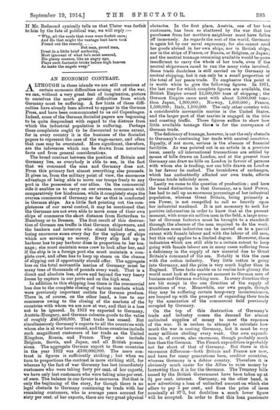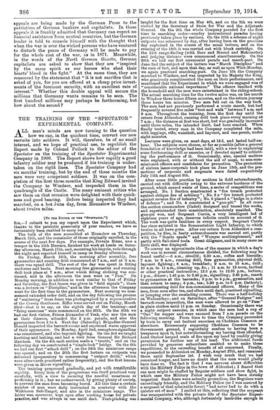AN ECONOMIC CONTRAST.
The broad contrast between the position of Britain and Germany lies, as everybody is able to see, in the fact that we command the seas and Germany does not. From this primary fact almost everything else proceeds. It gives us, from the military point of view, the enormous advantage of being able to move our troops freely to any port in the possession of our allies. On the commercial side it enables us to carry on our oversea commerce with comparatively few hindrances, while it completely stops the oversea commerce of Germany so far as that is conducted in German ships. As a little fact pointing out the com- pleteness of our naval control, it may be mentioned that the Germans are not even able to move some of their own ships of commerce the short distance from Rotterdam to Hamburg or to Bremen. The first result of this destruc- tion of German sea traffic is that German shipowners, and the bankers and investors who stand behind them, are losing enormous sums every day for the upkeep of ships which are earning no money. Every ship laid up in i harbour has to pay harbour dues in proportion to her ton- nage ; she must maintain some crew to look after her, and if the ship is in a foreign port she must maintain a com- plete crew, and often has to keep up steam on the chance of slipping out if opportunity should offer. The aggregate loss on the total mercantile marine of Germany must be many tens of thousands of pounds every week. That is a direct and absolute loss, above and beyond the very heavy losses by capture in our ports and on the high seas. In addition to this shipping loss there is the commercial loss due to the complete closing of various markets which were previously important outlets for German produce. There is, of course, on the other hand, a loss to our commerce owing to the closing of the markets of the countries with whom we are now at war, and that is a loss not to be ignored. In 1913 we exported to Germany, Austria-Hungary, and German colonies goods to the value of roughly £46,000,000. That trade has ceased. But simultaneously Germany's exports to all the countries with whom she is at war have ceased, and those countries include such magnificent customers of her trade as the United Kingdom, Russia, and France. They also include Belgium, Servia, and Japan, and all British posses- sions. The aggregate German export to these countries in the year 1912 was £180,000,000. The mere con- trast in figures is sufficiently striking ; but when we turn to proportions the contrast is more striking still, for whereas by the fact of war Germany has lost immediately customers who were taking forty per cent. of her exports, we have only lost customers who were taking nine per cent. of ours. The balance in our favour is enormous. But that is only the beginning of the story, for though there is no legal obstacle to Germany continuing to trade with her remaining customers, who in average years account for 'sixty per cent. of her exports, there are very great physical obstacles. In the first place, Austria, one of her best customers, has been so shattered by the war that her purchases from her northern neighbour must have fallen off immensely. As regards the rest of the world, Germany is again hit by our naval supremacy, for she cannot send her goods abroad in her own ships, nor in British ships, nor in the ships of France, or Russia, or Belgium, or Japan ; and the neutral tonnage remaining available would be quite insufficient to carry the whole of her trade, even if the neutral shipowners cared to run the many risks involved. Some trade doubtless is still carried on by Germany in neutral shipping, but it can only be a small proportion of the total of her peace trade. To emphasize this point it is worth while to give the following figures. In 1911, the last year for which complete figures are available, the British Empire owned 13,500,000 tons of shipping ; the German Empire came next with about 3,000.000 tons ; then Japan, 1,800,000 ; Norway, 1,600,000 ; France, 1,500,000 ; Italy, 1,100,000. The only other country with a considerable mercantile marine is the United States, and the larger part of that marine is engaged in the lake and coasting traffic. These figures suffice to show how little available tonnage them is for the conveyance of German trade.
The deficiency of tonnage, however, is not the only obstacle to Germany's continuing her trade with neutral countries.
Equally, if not more, serious is the absence of financial facilities. As was pointed out in an article in a previous issue, nearly all international transactions are settled by means of bills drawn on London, and at the present time Germany can draw no bills on London in favour of persons with whom she is trading, nor can bills drawn on London in her favour be cashed. The breakdown of exchanges, which has undoubtedly affected our own trade, affects German trade infinitely more.
Lastly we come to the question of production ; and here the broad distinction is that Germany, as a land Power, has had to call up an enormous percentage of her industrial population, whereas Great Britain, being primarily a sea Power, is not compelled to call so heavily upon her industrial manhood. It is not necessary to seek for positive information in order to know that at the present moment, with some six million men in the field, a large num- ber of German factories must be brought to a standstill through the absence of the men required to do the work. Doubtless some industries can be carried on to a partial extent with female labour and with the labour of old men, but this only applies to a limited degree. Moreover, those industries which are still able to a certain extent to keep going with female labour are in many cases suffering from a deficiency in the supply of raw material due to Great Britain's command of the sea. Notably is this the case with the cotton industry. Very little cotton is going into Germany, and the price is very much higher than in England. These facts enable us to realize how gloomy the world must look at the present moment to German men of business and German working men. In every direction they are hit except in the one direction of the supply of munitions of war. Meanwhile, our own people, though they may be suffering certain temporary inconveniences, are buoyed up with the prospect of expanding their trade by the annexation of the commercial field previously occupied by Germany.
On the top of this destruction of Germany's trade and industry comes the demand for almost unlimited supplies of money to meet the expenses of the war. It is useless to attempt to calculate how much the war is costing Germany, but it must be very many millions sterling every week. Our own expendi- ture is, of course, also enormous, though probably much less than the German. The French expenditure is probably not far short of that of Germany. But there is this enormous difference—both Britain and France are now, and have for many generations been, creditor countries, whereas Germany is a debtor country. Therefore it is obviously much easier for the Allies to raise money by borrowing than it is for the Germans. The Treasury bills issued by the British Government have been taken up at 311 per cent. interest. Germany, on the other hand, is now advertising a loan of unlimited amount on which she offers to pay 5 per cent., and fixes the price of issue nominally at 97'3, but doubtless a much lower figure will be accepted. In order to float this loan passionate appeals are being made by the German Press to the patriotism of German bankers and capitalists. In these appeals it is frankly admitted that Germany can expect no financial assistance from neutral countries, but the German lender is told to console himself with the thought that when the war is over the wicked persons who have ventured to disturb the peace of Germany will be made to pay for the whole cost of the war, as in 1871. Meanwhile, in the words of the North German Gazette, German capitalists are asked to show that they are " inspired by the same spirit as our heroes who shed their hearts' blood in the fight." At the same time, they are reassured by the statement that " it is not sacrifice that is asked of you, for you are offered at a cheap price invest- ments of the foremost security, with an excellent rate of interest." Whether this double appeal will secure the millions that Germany wants remains to be seen. The first hundred millions may perhaps be forthcoming, but how about the second?



































 Previous page
Previous page